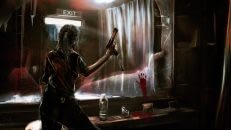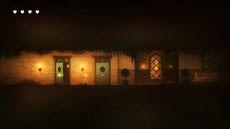The Journey Down: Over The Edge
It’s heartening to know, in the shadow of Tales of Monkey Island, that there are people out there still making point-n-click games where you actually point and click, instead of wrestling with a bollocks control scheme. The Journey Down, by one man army Theodor Waern (aka Skygoblin), is one of these games, and it promises to be as accomplished as any of its kind if future episodes prove as compelling as its first.
This first episode – titled Over The Edge – introduces you to your character, dockside gas station attendant Bwana, and his sidekick Kito. The pair face an unpayable $4000 bill after their friendly power supplier is taken over by an ominous sounding megacorp, when a researcher from the local university stops by with a solution to their troubles. As events unfold, the trio become targets of a conspiracy — but not before a good few hours of inventory-based puzzle solving.
The first thing one notices when the game starts proper is the attention paid to detail in character design and the backdrops they inhabit. It is night time, and each scene is lovingly drawn down to the pixel, using lighting effectively to establish a humorous yet seductive atmosphere well complemented by the reggae soundtrack. The three central characters are designed on African masks, and look fabulous – though the attentive will note that Bwana and Kito speak (silently) with a Jamaican slant rather than African. Personally, I accepted this mash-up of characterisation and just carried on with the game.
Most NPCs are depicted rather minimally, but are recognisable from their context on screen, and every one takes on another dimension when spoken to. Sailors, a fisherman, a fat Jamaican woman, a snobbish bouncer… all seemingly predictable at a glance, yet turning out to all be infused with a little originality. That said, there are one or two cases of questionable stereotyping. Bwana and Kito’s habit of adding “mon” at the end of every other sentence is acceptable if slightly hard to swallow, but the dialogue of an angry Japanese chef raised an eyebrow more than once. The script, while mostly entertaining, is on such occasions amateurish and uncomfortable to read.
On a lighter note, the puzzles — of course as important as anything — are quite logical, somewhat surprisingly for the genre. There are no rubber-chicken-with-a-pulley-in-the-middle oddities here. As long as you thoroughly question NPCs and pay attention to the environments, the game proceeds at a comfortable pace while still throwing up plenty of satisfying ‘aha!’ moments. There are a couple of points where you might get lost, but the game areas are tight enough that you won’t be stranded for long.
The puzzles are generally derived from needing to fix Bwana’s airship, so the actual story takes a backseat while you run around combining items and messing with people. The eventual cliffhanger, though, is pretty funny and nicely sets up the next episode for just about anything, answering no questions and perhaps proposing a few more. Hopefully the few rough edges will be sanded down in episode two – other than that, I look forward to wherever Bwana and co are headed.





